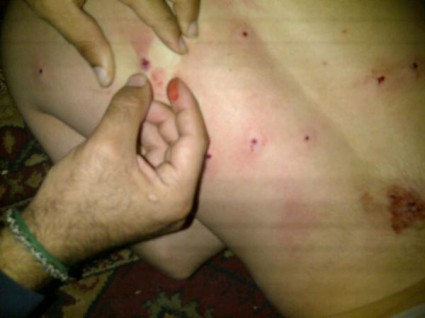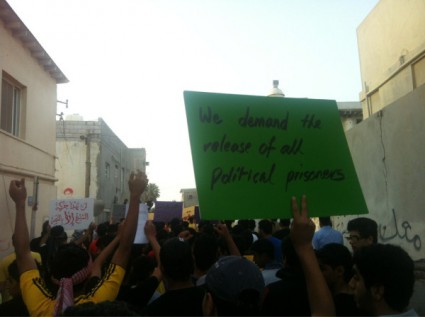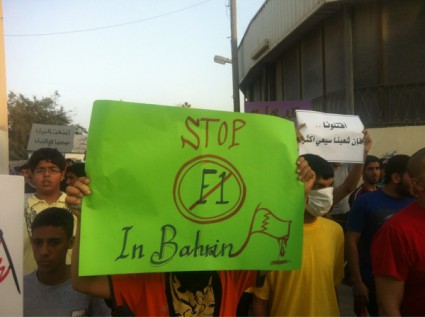MOI Police and Regime Loyalist Stock-up in Preparation for F1
April 12, 2012 No Comments
Asimbonanga “broken silence is what I dream”
April 12, 2012 No Comments
Biko – “you can blow out a candle but you can’t blow out a fire”
April 12, 2012 No Comments
Redemption Songs
April 12, 2012 No Comments
King Hamad your the big tree, we are the small axe
April 12, 2012 No Comments
Shoutout for Abdulhadi al-Khawaja – Allāhu Akbar!
April 12, 2012 No Comments
Extensive Casualities involving Shotgun Wounds by MOI Police ahead of F1
April 12, 2012 No Comments
Bahrain Private Health Care System thrives under regime
April 12, 2012 No Comments
Ecclestone and FIA send encouraging sign for Olympic Games bid by North Korea
Human Rights Watch warns Formula 1 over Bahrain Grand Prix
By Edd Straw – 12 April, 2012 – AutoSport.com
Bahrain Human Rights Watch has warned Formula 1 that by holding next week’s Bahrain Grand Prix, it will be endorsing the kingdom’s regime despite claims that sport and politics don’t mix.
Joe Stork, the deputy middle east director of Human Rights Watch, which monitors human rights issues worldwide, stopped short of calling for the race to be cancelled in an interview with AUTOSPORT. But he believes that if the race does happen then F1 will be seen as supporting the government.
“You can’t say that you are not mixing politics and sport when you are coming down on one side,” Stork told AUTOSPORT. “You may prefer not to be facing the choice of whether to go in or stay out, but this is the choice F1 faces. Whatever decision it takes, there is a political aspect to it.
“We don’t feel that it is our place to be calling for F1 to boycott Bahrain. But it is not a very good situation and it’s getting steadily worse. We are not security experts, so that’s a whole separate consideration that F1 needs to take into account as well.
“We are looking at a lockdown. F1 is not my world, but this seems to be a terrible climate in which to hold what is supposed to be a competitive, festive sporting event. In the circumstances, I don’t know who is going to be having any fun.”
Stork believes that even though there is a good chance that security forces in Bahrain can make the race itself safe, F1 will face serious questions about its willingness to race there.
Protests against the race have been ongoing in Bahrain in recent weeks according to widespread news reports, and they are expected to continue once F1 arrives.
“I think that they [F1] will have some explaining to do,” said Stork. “I can easily imagine that the security will be such that you won’t have the race disrupted on the track and I imagine that they can keep that under control.
“But if you have a situation where there are demonstrations on a nightly, if not daily basis, clashes with security forces who aren’t known for the most sophisticated crowd control techniques is not going to be good.
“It’s not going to be good for Bahrain, it’s not going to be good for F1 either if it happens either during the race or when it’s clear that the demonstrations are primarily aimed at stopping the race. That’s what the story will be.”
Stork accepts that staging the race will be a positive for some in the kingdom – specifically the government – but that this is not a valid argument for the race going ahead.
“From the Bahraini government’s point of view, of course,” he said when asked if there were potential benefits to the race going ahead. “They are desperate to make the case that the situation is normal from a security point of view, normal in terms of civil strife, and that it’s one big happy family.
“But the fact is, it’s not normal. I’m not sure that it’s the mission or the mandate of F1 to be participating in these kinds of exercises.
“Then there’s the financial aspects. The economy of Bahrain is not in the best shape given the year-plus of civil unrest. F1 is a money-maker and is good for Bahraini business and tourism.
“The [ruling] Al Khalifa family are desperate for [the grand prix] to happen. But that doesn’t mean that it should happen.” …source
April 12, 2012 No Comments
The Enablers of Human Rights Abuse
Shocking Facts About Who’s Arming Human Rights Abusers
12 April, 2012 – Amnesty Interational
Just six countries export a whopping 74 percent of the world’s weapons, with the US making up 35 percent of the global total.
Treaties regulate the global trade of many products – even bananas and dinosaur bones – but not guns and bullets. We need a strong Arms Trade Treaty that will stop tools of death from getting into the hands of people like Syria’s Assad and Sudan’s Bashir who continue to brutalize their people.
In July, UN member countries will debate the adoption of a global Arms Trade Treaty. Take action to make sure they make the right decision — to keep weapons out of the wrong hands!
April 12, 2012 No Comments
F1 Circus – MOI scandal riddled “hired gun” Yates, reassures F1 attendees. US calls to protect protesters
Yates is a credible figure to a point, he is after all being employed by the Interior Ministry; he was forced to resign from the police over the way he conducted the investigation into the phone hacking scandal at the News of the World. Yet despite his intervention and the British Government’s ongoing advice that travel to Bahrain is not restricted, the teams’ own risk assessments indicate that there are potential risks from isolated incidents and even a kidnap risk. They are also concerned about protestors getting hurt whilst making their voices heard against F1′s presence in the country, as everyone feels is inevitable.
FIA sends out message that Bahrain is safe for F1 as US government speaks up
12 April, 2012 – Darren Heath – JA.F1
[Updated] In the paddock at Shanghai today the talk is all on one subject: the Bahrain Grand Prix and whether it will take place next week. Although an emerging protest into the Mercedes front wing looks like it will soon take some of the spotlight off the politics.
The Bahrain situation is now acquiring an acute feel to it, with many team members and media due to fly from Shanghai to Bahrain in little over 72 hours time. The teams are clearly very concerned about the event and looking to the FIA for leadership.
FIA president Jean Todt will arrive in Shanghai on Friday night and will come into the circuit on Saturday, while Bernie Ecclestone arrived today and will meet with the 12 teams at lunchtime on Friday. Ecclestone told Reuters this afternoon that the race is on, unless the Bahrainis themselves decide to call it off.
Although he has said nothing on the matter in public, Todt has today issued a letter from former Metropolitan Police chief John Yates, who was heading the security operation at the London 2012 Olympics and is now on a short term contract with the Bahraini Government on a security brief, following the BICI enquiry into last year’s uprising. The letter is intended to show that the FIA’s assessment is that it will be safe for F1 to race in Bahrain next week.
Yates, who has been living in Bahrain since January, says that the situation on the ground in Bahrain is not as is being portrayed in the media and that trouble consists of a few small protests involving youths and that there is no security risk to F1 teams and personnel. What he calls “the real picture of life in Bahrain” is being distorted by the opposition messaging and this is leading to an inaccurate picture being portrayed in the media and to the teams. A report by Lotus following a recce last week also found the situation relatively normal, but the teams’ fear is that once the F1 circus sets up at Sakhir, things could quickly escalate.
Yates’s letter says the protests are from a “very small minority – often groups of 15-20 young men. These are criminal acts being perpetrated against an unarmed police force who, in the face of such attacks, are acting with remarkable restraint.
“These people are intent on causing harm to the police and the communities in which they live. They are not representative of the vast majority of delightful, law-abiding citizens that represent the real Bahrain that I see every day. Along with my family, I feel completely safe. Indeed, safer than I have often felt in London.”
Yates is a credible figure to a point, he is after all being employed by the Interior Ministry; he was forced to resign from the police over the way he conducted the investigation into the phone hacking scandal at the News of the World. Yet despite his intervention and the British Government’s ongoing advice that travel to Bahrain is not restricted, the teams’ own risk assessments indicate that there are potential risks from isolated incidents and even a kidnap risk. They are also concerned about protestors getting hurt whilst making their voices heard against F1′s presence in the country, as everyone feels is inevitable.
So far however, there has been no focal point for calls to abandon the race, rather a general fear and unease. However a statement from the US Government on Wednesday may provide the start of such a rallying point. White House spokesman Jay Carney said, “The United States continues to be deeply concerned about the situation in Bahrain, and we urge all parties to reject violence in all its forms.
“We condemn the violence directed against police and government institutions, including recent incidents that have resulted in serious injuries to police officers.
“We also call on the police to exercise maximum restraint, and condemn the use of excessive force and indiscriminate use of tear gas against protesters, which has resulted in civilian casualties.”
April 12, 2012 No Comments
MOI use of “birdshot”, “live rounds” increases prior to Bahrain F1
April 12, 2012 No Comments
Violent MOI Police attacks on protesters could cause bad press for Bahrain F1?
Bahraini Police Must Protect Peaceful Demonstrators during Formula One Event
12 April, 2012 – Human Rights First
Washington, DC – Human Rights First today raised concerns that Bahraini police will attack, rather than protect peaceful protestors who are expected to demonstrate during this weekend’s Formula One racing event. The organization noted that, in past protests, Bahraini demonstrators have been met with excessive force and that organizers have an obligation to thwart a repeat of these abuses.
“In the past year, the Bahraini police have proven time and again that their preferred response to peaceful demonstrators is brutality, arrest, and torture,” said Human Rights First’s Brian Dooley. “Until the government addresses these issues, we remain concerned for the safety of protesters.”
Since February of last year, the government of Bahrain has engaged in an ongoing crackdown on protestors, unfairly prosecuting protestors, including medics and educators, and torturing those in police custody. The police force is not trusted by Bahraini citizens, who often fear that going to the police for any reason will result in their prosecution. Human Rights First is concerned that there is no guarantee for the safety of protestors during the Formula One race; in the past they have been subjected to excessive force, beatings, and tear gas.
“Until the government of Bahrain addresses the pervasive human rights abuses, the Formula One race will forever be associated with a brutal regime intent on violently attacking its own citizens,” concluded Dooley. …source
April 12, 2012 No Comments
Support the future of Bahrain F1 – Don’t Come in 2012
April 12, 2012 No Comments
Bahrain F1 is simple choice, fund the blood spilling by the regime or Steer Clear
editor: The teams and the FIA can “steer clear” and wait for “fair day” in Bahrain to hold their race or they can let it become a bloody stain that rolls around every year. It seems a no brainier, but if one heeds the idiocy of an ego tripping Ecclestone and fiscally desperate King Hamad, they put the entire FIA enterprise to shame and push the whole pack into the bloody walls of Bahrain. Phlipn.
Bernie Ecclestone will meet F1 teams to discuss Bahrain GP
By Dan Roan – 12 April, 2012
F1 boss Bernie Ecclestone will meet the sport’s 12 teams in Shanghai on Friday to discuss whether the controversial Bahrain Grand Prix should go ahead, the BBC has learned.
However a senior FIA official told the BBC “The race is still on. The situation is not like last year.”
2011’s race was called off following pro-democracy protests in the country.
But now a number of them expect the race to be called off amid security concerns caused by civil unrest.
On Tuesday Ecclestone said no teams had expressed concerns to him and a summit has been called ahead of this weekend’s Chinese Grand Prix.
Despite holding the meeting, Ecclestone said on Thursday only the Bahrain sporting authorities could cancel the race. “The race is on the calendar,” he said. “It’s scheduled.”
Formula 1: Bahrain GP row explained
The Formula One Teams’ Association (Fota), meanwhile, insists it is down to the sport’s governing body, the FIA, to cancel the race. But the BBC can reveal Friday’s crisis meeting will not include FIA chief Jean Todt who does not arrive in Shanghai until Saturday.
That may mean any decision is delayed until the weekend, with cars scheduled to be air-freighted to Bahrain on Sunday night.
Bahrain authorities remain confident the race will go ahead.
Unlike last year, the Bahrain authorities are in no mood to cancel the race themselves, so the decision rests with the FIA this time.
But, speaking on condition of anonymity from Shanghai where the third stage of the F1 takes place on Sunday, the senior FIA official told the BBC’s Bill Law that John Yates – Scotland yard’s assistant commissioner until he resigned last year but now serving as a special advisor to Bahrain’s Minister of Interior – has been reassuring. …more
April 12, 2012 No Comments
Webber, if you come to F1 your “involved in the situation”, most Bahrainis are for F1, just not with murderous regime as benefactor
Webber, “We don’t want to be involved in the situation that is out there, but the people that support our race are on one side and that’s why it is so sensitive.”
Webber says F1 drivers have no choice but to trust FIA to make right call on Bahrain
By Jonathan Noble and Edd Straw – 12 April, 2012 – AutoSport.com
Mark Webber, Red Bull RacingMark Webber believes that Formula 1 drivers have no choice but to trust the FIA to make the right decision on whether the Bahrain Grand Prix will be safe.
The Australian described it as a “waste of time” for the drivers to discuss the issue because there are so many different agendas and perspectives and that the FIA is in the position to make a call on whether the race should go ahead.
“We can only go on what the FIA are reading into the situation and we are putting an immense amount of trust in them in going to and from the track each day, competing at the track and having a normal grand prix weekend,” said Webber.
“There are some massive decisions to be made. It is a difficult decision now because we are a week away. Now it’s topical, there is a lot more pressure involved in the decision-making process and it’s on the FIA as the teams and Bernie [Ecclestone] have stated.
“We all know why it has dragged a bit. With the funding and finances that have come from Abu Dhabi and Bahrain and the Middle East, they are excited about F1 and they clearly want to give it another go.”
The Australian was a critic of the possibility of racing in Bahrain last year, but admitted that it is difficult to get reliable information on the real situation to make a judgement on next week’s event.
“I’ve tried to watch the news to get the most balanced view that I can possibly get without being too corrupted with other information,” said Webber. “It has been a little quieter but sitting here I have as much information as anyone else really.
“If I have a choice, then I want to race. That’s what I want to do. But saying that, you cannot ignore the fact that in the back of your mind there are a lot of good people in our sport and all of them want it to go down smoothly. We don’t want to be involved in the situation that is out there, but the people that support our race are on one side and that’s why it is so sensitive.”
Webber added that while increased security provisions have been put in place, he does have concerns that not everyone involved with F1 will benefit from the same level.
“There are [safety] measures in place and there is added security,” said Webber. “But we also accept that not everybody can have that and that doesn’t make me feel comfortable. Let’s hope that it [the extra security] is complete overkill.
“We need to trust that the people taking the decision know how these people are going to operate. I don’t know.” …more
April 12, 2012 No Comments
The Bahrain Grand Prix: Another Case of Burying Heads in the Sand?
Just yesterday, F1’s biggest player, Bernie Ecclestone, was reported as saying: “We’re not involved in any of the politics in Bahrain, over who is right or wrong” while world champion Sebastian Vettel’s view is: “We should go and race and not worry about something that’s not our business.”
The Bahrain Grand Prix: Another Case of Burying Heads in the Sand?
12 April, 2012 – Huffington Post – David Hobbs
Mike Gatting famously demonstrated some jaw-dropping naivety 22 years ago when, on the eve of a rebel England cricket tour to South Africa in 1990, he revealed: “I don’t know much about how apartheid works but one way to find out is by going there.”
As captain of the rebels who toured the country the year that Nelson Mandela was released after 27 years in prison, Gatting personified all that was wrong then – and still is now – about some sportsmen and women and their various governing bodies: ignorance and-or a refusal to believe that their actions may have ramifications far greater than they are willing or able to grasp.
Sport and politics don’t or shouldn’t mix was the favourite line from those justifying their actions but that hasn’t stopped Olympic boycotts over the years such as African nations staying away from Montreal in 1976 in protest at the New Zealand rugby tour of South Africa and more than 60 countries who didn’t travel to Moscow in 1980 over the Soviet Union’s invasion of Afghanistan. The UK government tried to stop the British team from going but the British Olympic Association was having none of that and sent a team that included the future London 2012 boss, Lord Coe. It seems boycotts and protests are a ‘good thing’ until it affects the people who have actually trained – probably for years – for their shot at the big time.
But politics and sport are inseparable, now more than ever. Surely nobody really believes that organisations such as FIFA or the International Olympic Committee operate in bubbles, untainted by world events or political pressures. How else can you explain Russia and China getting their hands on two of the world’s biggest sporting events? And Formula 1 is no different.
Seventeen years ago, the Federation Internationale du Sport Automobile (FISA) cancelled the South African Grand Prix because of the issues surrounding apartheid. In the UK, this was at the height of the anti-apartheid movement that was desperately trying to persuade the British government to impose economic sanctions on South Africa. Mrs Thatcher resisted those calls but F1 gave in and didn’t return to the country until 1992. So, is it a big hurrah for F1’s noble stand?
Well, no. There had been a GP in South Africa every year bar one since 1960. So those are the years that included the Sharpeville Massacre, the Soweto uprising, the death of Steve Biko and many other related tragedies. FISA’s exit was belated to say the least, so why should the sport now care about protestors in a small middle-eastern kingdom.
Just yesterday, F1’s biggest player, Bernie Ecclestone, was reported as saying: “We’re not involved in any of the politics in Bahrain, over who is right or wrong” while world champion Sebastian Vettel’s view is: “We should go and race and not worry about something that’s not our business.” …more
April 12, 2012 No Comments
Enough is enough: Abdulhadi al-Khawaja has waited long enough for justice
Enough is enough: Abdulhadi al-Khawaja has waited long enough for justice
11 April, 2012 – IRCT
The International Rehabilitation Council for Torture Victims (IRCT) today reiterated its calls for the immediate release of Abdulhadi al-Khawaja, now on his 63rd day of hunger strike. The call comes following a visit to al-Khawaja by an IRCT doctor in recent days.
As a result of the hunger strike, al-Khawaja is in extremely poor health.
The IRCT doctor, a European Union citizen, was joined in assessing al-Khawaja by an Egyptian Doctor. The resulting report will be the first medical report on his condition since his hunger strike began.
The medical report on al-Khawaja’s current condition is being finalised and will be sent to the Bahraini authorities upon completion. The Bahraini authorities will then make this report public, as agreed with the doctors.
Prior to his recent hunger strike, Mr al-Khawaja was already a documented survivor of torture. The Bahraini state is therefore ultimately responsible for his current condition.
“He is therefore in need of holistic rehabilitation,” said Scott McAusland of the IRCT.
“And of course, the perpetrators of his torture must be held to account by the Bahraini authorities,” added McAusland.
For more information:
Please see our previous press release (“IRCT calls on Bahrain to immediately release human rights defender” 17 February 2012) regarding Mr al-Khawaja here.
Media contact
Scott McAusland, IRCT Head of Communications
+45 36 93 87 32
sma@irct.org
About The International Rehabilitation Council for Torture Victims
The International Rehabilitation Council for Torture Victims is an independent non-profit global organisation with a membership of 144 rehabilitation centres in 73 countries and with over 25 years’ experience.
The work of the IRCT is threefold:
* Rehabilitation of torture victims and their families
* Ensuring victims’ access to justice
* Eradication of torture
April 12, 2012 No Comments



































